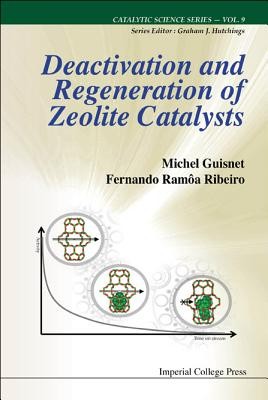
- We will send in 10–14 business days.
- Publisher: Imperial College Press
- Year: 2011
- Pages: 340
- ISBN-10: 1848166370
- ISBN-13: 9781848166370
- Format: 15.2 x 23.1 x 2 cm, hardcover
- Language: English
- SAVE -10% with code: EXTRA
Deactivation and Regeneration of Zeolite Catalysts (e-book) (used book) | bookbook.eu
Reviews
Description
In chemical processes, the progressive deactivation of solid catalysts is a major economic concern and mastering their stability has become as essential as controlling their activity and selectivity. For these reasons, there is a strong motivation to understand the mechanisms leading to any loss in activity and/or selectivity and to find out the efficient preventive measures and regenerative solutions that open the way towards cheaper and cleaner processes. This book covers the fundamental and applied aspects of solid catalyst deactivation in a comprehensive way and encompasses the state of the art in the field of reactions catalyzed by zeolites. This particular choice is justified by the widespread use of molecular sieves in refining, petrochemicals and organic chemicals synthesis processes, by the large variety in the nature of their active sites (acid, base, acid-base, redox, bifunctional) and especially by their peculiar features, in terms of crystallinity, structural order and textural properties, which make them ideal models for heterogeneous catalysis. The aim of this book is to be a critical review in the field of zeolite deactivation and regeneration by collecting contributions from experts in the field which describe the factors, explain the techniques to study the causes and suggest methods to prevent (or limit) catalyst deactivation. At the same time, a selection of commercial processes and exemplar cases provides the reader with theoretical insights and practical hints on the deactivation mechanisms and draws attention to the key role played by the loss of activity on process design and industrial practice.
EXTRA 10 % discount with code: EXTRA
The promotion ends in 19d.23:20:13
The discount code is valid when purchasing from 10 €. Discounts do not stack.
- Publisher: Imperial College Press
- Year: 2011
- Pages: 340
- ISBN-10: 1848166370
- ISBN-13: 9781848166370
- Format: 15.2 x 23.1 x 2 cm, hardcover
- Language: English English
In chemical processes, the progressive deactivation of solid catalysts is a major economic concern and mastering their stability has become as essential as controlling their activity and selectivity. For these reasons, there is a strong motivation to understand the mechanisms leading to any loss in activity and/or selectivity and to find out the efficient preventive measures and regenerative solutions that open the way towards cheaper and cleaner processes. This book covers the fundamental and applied aspects of solid catalyst deactivation in a comprehensive way and encompasses the state of the art in the field of reactions catalyzed by zeolites. This particular choice is justified by the widespread use of molecular sieves in refining, petrochemicals and organic chemicals synthesis processes, by the large variety in the nature of their active sites (acid, base, acid-base, redox, bifunctional) and especially by their peculiar features, in terms of crystallinity, structural order and textural properties, which make them ideal models for heterogeneous catalysis. The aim of this book is to be a critical review in the field of zeolite deactivation and regeneration by collecting contributions from experts in the field which describe the factors, explain the techniques to study the causes and suggest methods to prevent (or limit) catalyst deactivation. At the same time, a selection of commercial processes and exemplar cases provides the reader with theoretical insights and practical hints on the deactivation mechanisms and draws attention to the key role played by the loss of activity on process design and industrial practice.


Reviews